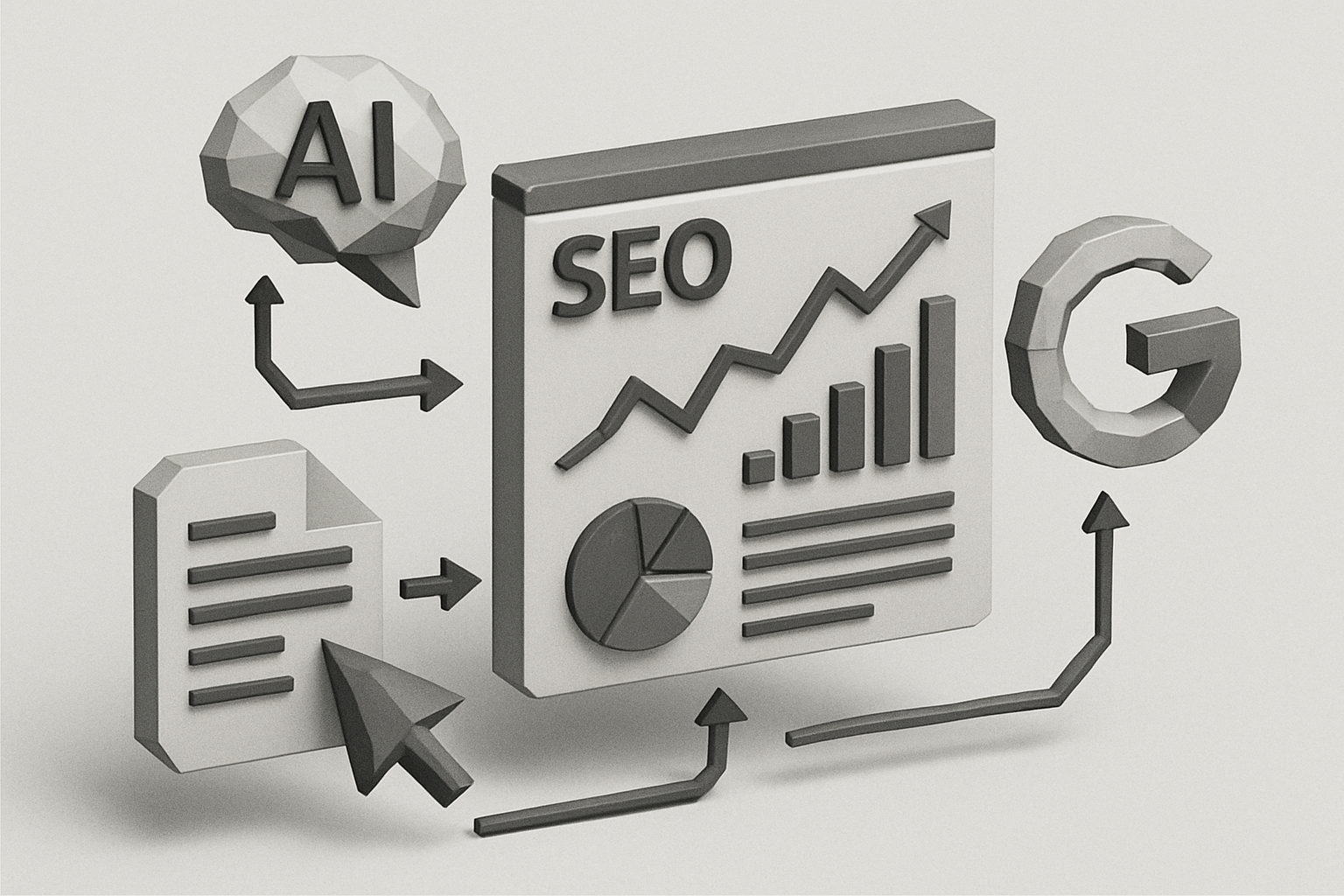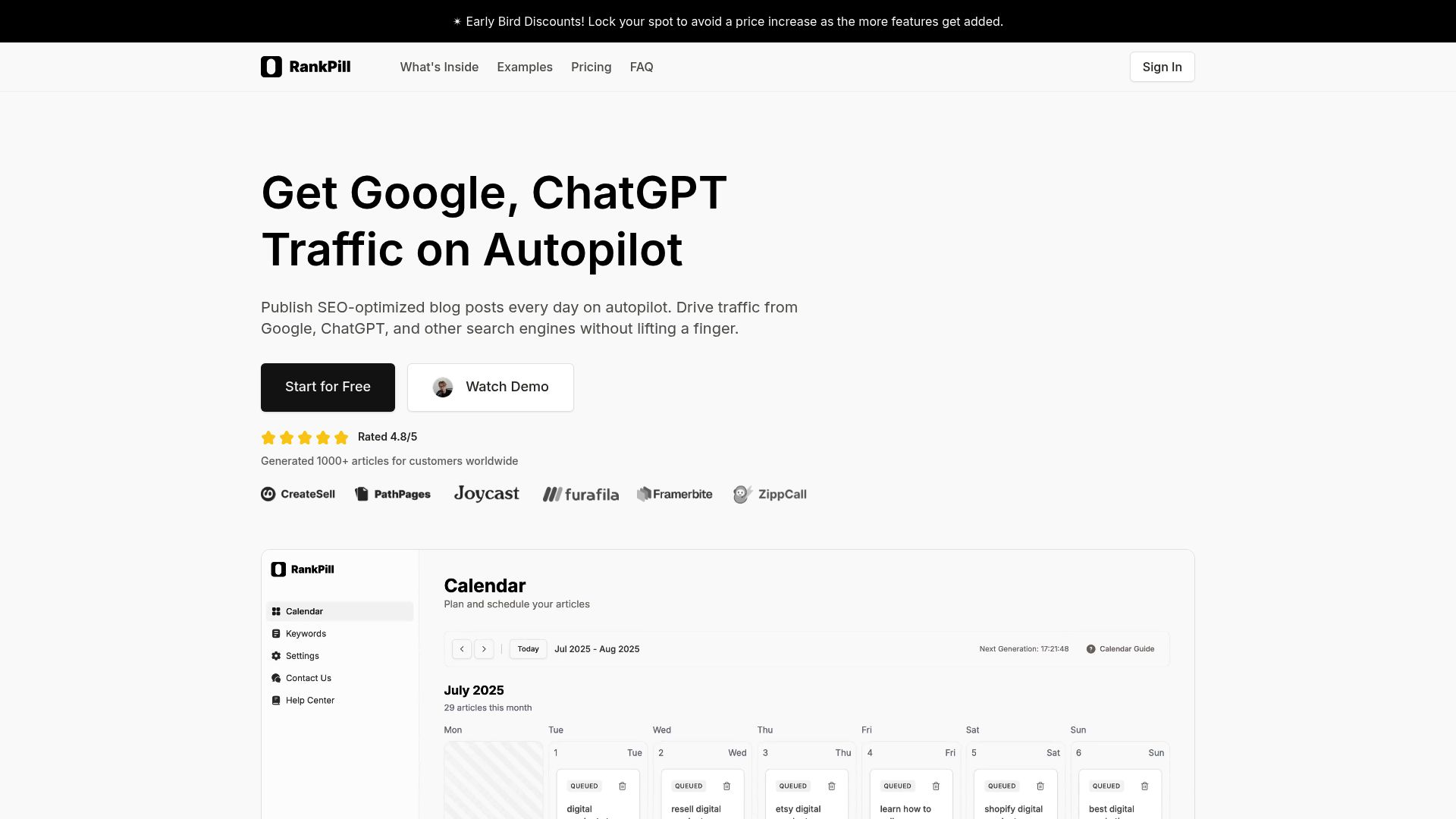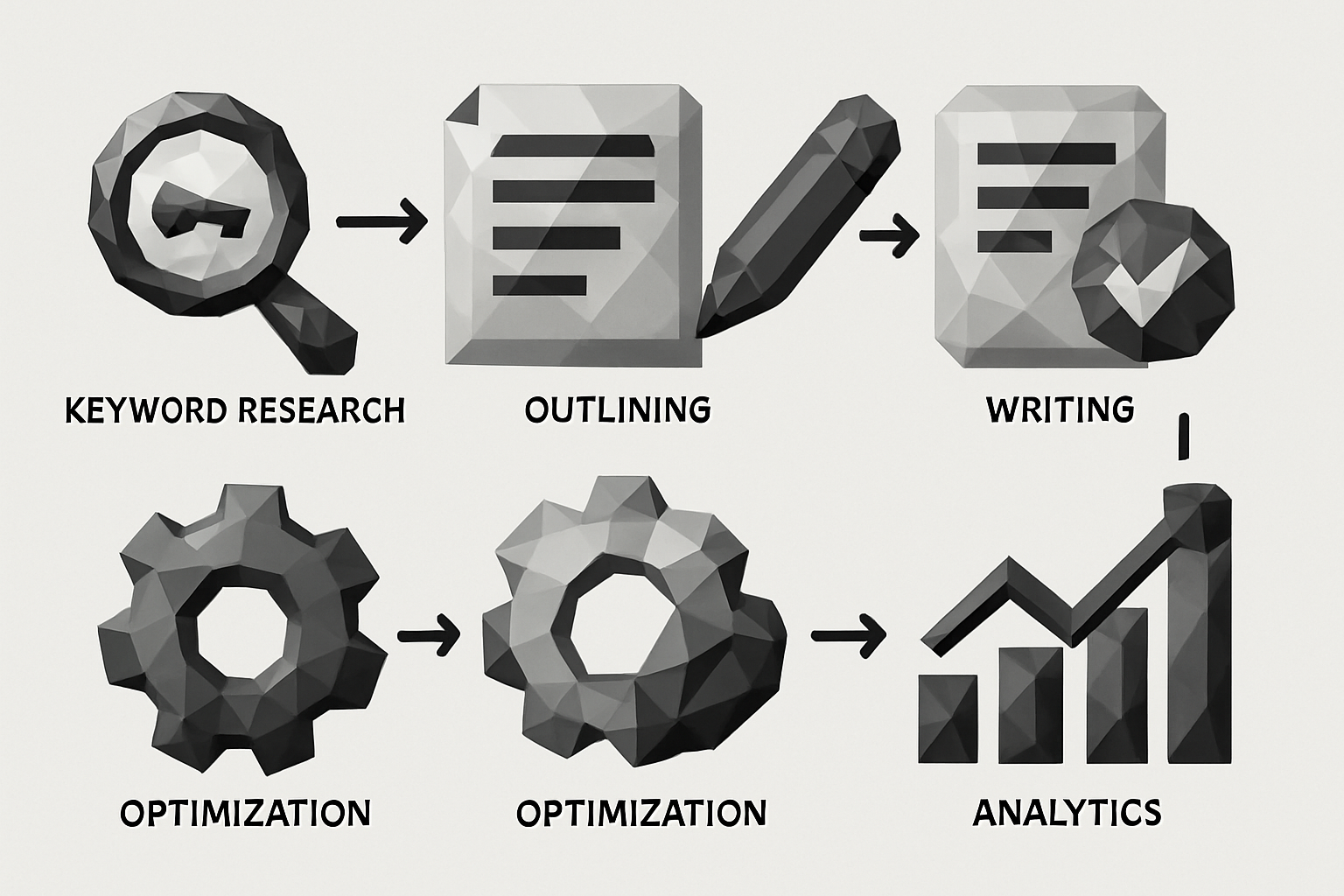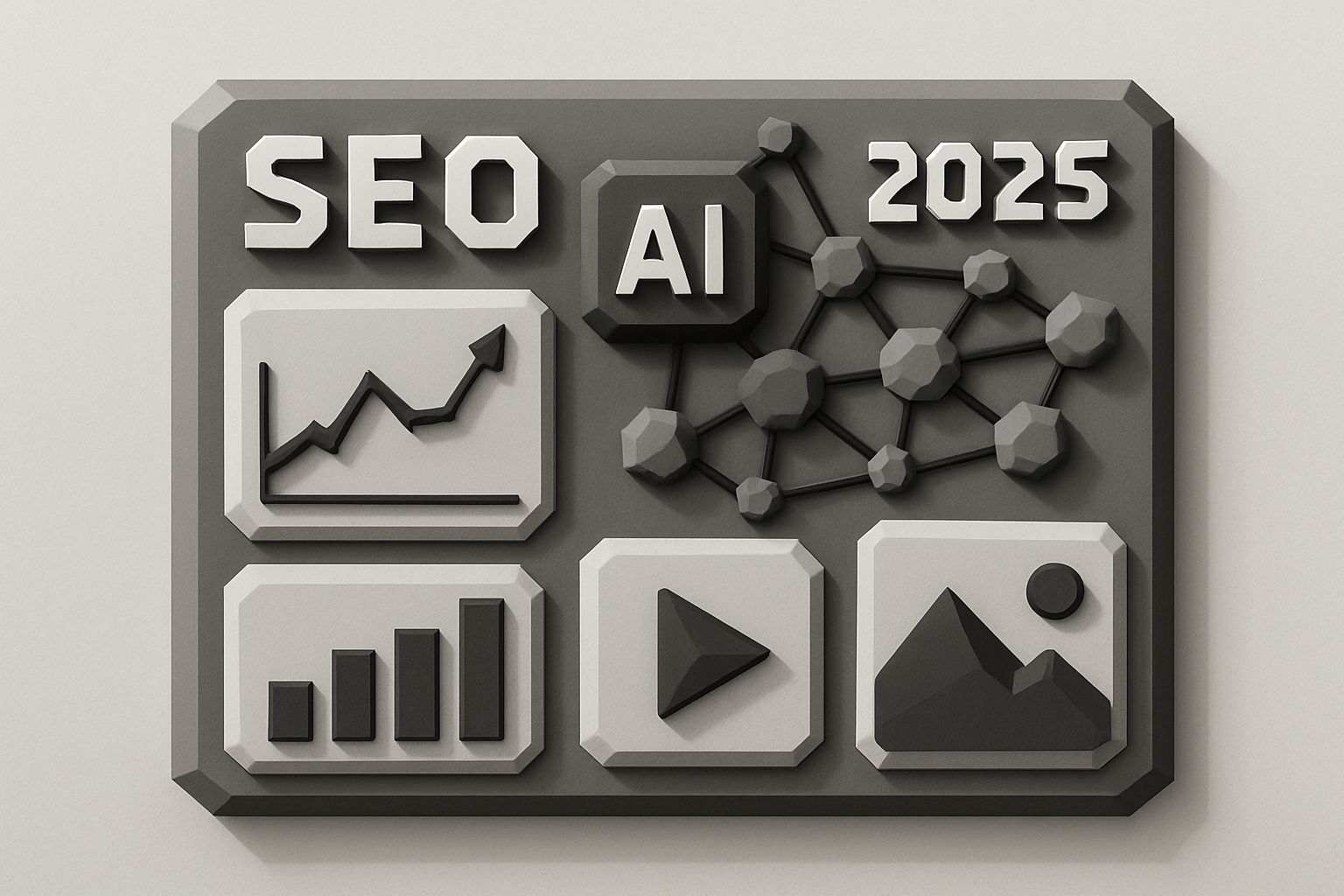Will AI-written content dominate Google in 2025, or will it sink your SEO efforts? The landscape is changing fast, and businesses need to adapt quickly.
AI is completely reshaping how we create and optimize digital content. As platforms evolve, mastering ai content for seo is now essential for anyone aiming to boost rankings, grow organic traffic, and secure long-term success.
Ready to future-proof your strategy? This guide reveals proven tactics, expert insights, and step-by-step advice you can use right away. Discover AI’s role in SEO, Google’s stance, quality standards, workflow integration, advanced optimization, and the trends that will define the next era.
The State of AI Content in SEO for 2025
AI content for SEO is transforming how marketers create and optimize digital content. The landscape is evolving quickly, with new tools, changing algorithms, and shifting best practices. Let’s break down where things stand in 2025, from industry adoption to Google’s policies and the latest trends.

AI’s Growing Influence on SEO
The use of ai content for seo has surged, becoming a mainstay for marketing teams across industries. AI-powered tools now automate keyword research, brainstorm content topics, and even generate full articles. Platforms like ChatGPT, Gemini, and Perplexity are changing how people search and interact online.
Google continues to update its algorithms to better handle AI-generated content. Meanwhile, AI-driven search engines are emerging, further impacting SEO strategies. Marketers benefit from faster, more consistent publishing thanks to these advancements. According to AI adoption in content marketing, over 60% of marketers now use AI tools for content creation—a number that’s only expected to grow.
Google’s Official Stance on AI Content
Google’s guidance on ai content for seo is clear: AI-generated content is acceptable if it’s helpful, original, and not spammy. The company places heavy emphasis on E-E-A-T—Experience, Expertise, Authoritativeness, and Trustworthiness.
Sites that rely on mass-produced, low-quality AI articles risk penalties. Google leverages its own AI to detect and demote spammy or manipulative content. In 2024, 75% of penalized sites used low-quality AI content, underscoring the importance of quality over quantity. Maintaining credibility and originality is essential when using AI for SEO.
Opportunities and Challenges of AI Content
AI content for SEO presents both major opportunities and notable challenges. On the plus side, AI enables rapid, scalable content creation, making it easier to cover long-tail and trending topics. However, there’s a real risk of producing generic, unoriginal, or factually incorrect content.
Balancing efficiency with human editorial oversight is key. Brands must ensure AI content fits their unique voice and meets audience expectations. For example, AI can quickly generate product descriptions, but expert-driven reviews still outperform in-depth analysis. AI can cut production time by 50%, but 40% of users still raise concerns about quality.
AI Content Across Different Search Platforms
The reach of ai content for seo now extends beyond Google. Search algorithms are evolving to better process AI-generated materials, and new AI-first search engines like Perplexity and ChatGPT Search are gaining traction. Optimizing for AI Overviews and answer engines is becoming standard practice.
AI content also impacts visibility on social platforms, voice assistants, and chatbots. Brands are seeing increased traffic from sources like ChatGPT and Perplexity summaries. In fact, 1 in 4 searches today involve AI-powered platforms, making multi-channel optimization more important than ever.
Key Trends Shaping AI Content for SEO in 2025
Several trends are defining the future of ai content for seo. Generative AI models are becoming more context-aware and accurate, reducing mistakes and improving relevance. AI tools now integrate multimedia—images, video, and audio—for richer, more engaging content.
There’s rising demand for hyper-personalized, user-centric AI content. Teams are blending human and AI workflows, using AI for research and structure while relying on experts for insights. AI tools can even identify content gaps based on competitor analysis. Notably, 80% of successful SEO teams now combine AI automation with expert review for optimal results.
Crafting High-Quality AI Content That Ranks
Creating AI content for SEO in 2025 means more than just generating words—it’s about crafting pieces that truly satisfy both search engines and users. Let’s break down the essential ingredients for building content that not only ranks but also delivers value and trust.
What Makes AI Content “SEO-Ready”?
For AI content for SEO to truly succeed, it must align with user intent and deliver original, comprehensive answers. Google’s systems reward depth, accuracy, and clear structure—think headings, bullet lists, and schema markup.
Using authoritative sources and citing references elevates credibility. For example, an AI-generated article that meets Google’s Helpful Content criteria will outperform generic pieces every time. E-E-A-T (Experience, Expertise, Authoritativeness, Trustworthiness) is now a must-have baseline for any AI content for SEO.
Want a deeper dive? Learn more about creating content with AI tools for modern SEO.
| Factor | Impact on SEO Ranking |
|---|---|
| E-E-A-T Signals | 2x higher performance |
| Structured Formatting | Improved SERP visibility |
Overcoming AI Content Pitfalls: Accuracy, Originality & Engagement
While AI content for SEO offers speed, it comes with risks—like factual inaccuracies or generic, duplicated outputs. “AI hallucinations” can damage trust and even trigger penalties.
To avoid these pitfalls:
- Always fact-check and verify AI-generated data.
- Add human insights, real examples, and unique brand perspectives.
- Enrich drafts with personal stories or case studies.
Human editors play a vital role in transforming AI content for SEO into engaging, high-quality assets. About 30% of AI drafts need significant editing before publication, so never skip this step.
Optimizing AI Content for Google’s E-E-A-T
To rank with AI content for SEO, focus on demonstrating real expertise and experience. Attribute articles to genuine authors or subject matter experts. Add trust signals by referencing reputable sources, linking to credentials, and including external citations.
AI can help structure authoritative content, but it shouldn’t be the sole creator. For instance, many health sites use AI for research and outlines, then rely on doctors for final reviews—ensuring both scale and authority.
Pages optimized for E-E-A-T see up to 40% higher rankings, so make this a core part of your workflow.
Ensuring Content Uniqueness and Avoiding Duplication
Originality is non-negotiable for AI content for SEO. Use AI for ideation, but never publish outputs without customization. Always check for plagiarism and run AI detection tools to avoid duplicate content flags.
Tailor AI drafts with proprietary data, unique business stats, or original insights. For example, instead of using a generic AI-generated product review, add your own testing results or customer feedback.
Did you know? Half of penalized AI content in 2024 was flagged as duplicate. Protect your site by prioritizing uniqueness.
Enhancing User Experience with AI Content
User experience is at the heart of successful AI content for SEO. Break up text with short paragraphs, bullet points, and clear headings. Integrate visuals—like images, videos, and infographics—using AI-powered tools.
Personalize content based on user preferences or browsing behavior. AI can even suggest internal links and related articles, keeping readers engaged and boosting dwell time.
Articles enhanced with multimedia see 25% higher engagement, so always look for ways to make your content more interactive and visually appealing.
How RankPill Automates High-Quality SEO Content Creation
RankPill takes AI content for SEO to the next level by automating your entire content process. It offers personalized keyword research, automated writing, built-in SEO optimization, and even multimedia integration—all in one platform.

Small businesses, agencies, and e-commerce sites use RankPill to scale content effortlessly and consistently. Its unique value lies in combining competitor analysis, a content calendar, and visual enhancements. Many users report up to 3x faster content production and 2x organic growth, thanks to daily automated articles.
If you’re ready to streamline and supercharge your AI content for SEO, RankPill is a solution worth exploring.
Integrating AI Into Your SEO Content Workflow
Integrating ai content for seo into your workflow isn’t just a trend—it’s now essential for staying competitive. With the right strategy, you can harness AI at every stage, from planning to publishing, to streamline content creation and drive measurable results.
Below, you’ll find a step-by-step workflow designed to help you maximize efficiency and quality with ai content for seo.

Step 1: AI-Driven Keyword Research and Topic Ideation
The first step in leveraging ai content for seo is automating keyword research and topic ideation. AI tools can rapidly analyze your competitors, uncover search trends, and suggest high-potential keywords.
- Generate topic clusters automatically.
- Build content calendars based on real data.
- Surface untapped long-tail opportunities.
By using ai content for seo at this stage, you reduce manual research time by up to 70%. Always validate AI-suggested keywords to ensure strategic alignment with your goals.
Step 2: Outlining and Structuring Content with AI
Once you have your keywords, ai content for seo tools can help you build detailed, SEO-friendly outlines. These platforms create logical structures, ensuring each article matches search intent and covers relevant subtopics.
- Organize content with H2s and H3s for clarity.
- Map out sections to address user questions.
- Ensure comprehensive coverage of each subject.
Structured content is 50% more likely to earn featured snippets. AI-generated outlines save time and keep your content focused and effective.
Step 3: Drafting Content with AI Assistance
Drafting becomes much faster with ai content for seo solutions. Use AI to create first drafts, introductions, and even section content tailored to your brand’s voice.
- Prompt AI with specific instructions for tone and style.
- Integrate business data or product details for relevance.
- Adjust drafts to fit your audience’s needs.
AI can accelerate the drafting stage by 60%. Still, review and refine drafts to ensure the content is both engaging and accurate.
Step 4: Human Editing, Fact-Checking, and Brand Alignment
Even the best ai content for seo needs a human touch. Editors play a crucial role in reviewing AI outputs for accuracy, originality, and alignment with brand guidelines.
- Fact-check all statements and statistics.
- Add unique insights, case studies, or personal stories.
- Refine language to match your brand’s tone.
Top-performing AI content always involves human oversight. This step elevates quality and helps your content stand out in search results.
Step 5: SEO Optimization and Multimedia Enhancement
Optimizing ai content for seo goes beyond just text. Use AI to suggest meta tags, internal links, and schema markup. Tools can also recommend and embed visuals, videos, or infographics for a richer user experience.
- Enhance articles with relevant multimedia.
- Improve on-page SEO with AI-driven suggestions.
- Integrate Optimizing SEO with AI tools for advanced automation and efficiency.
Multimedia-rich, well-optimized content can boost click-through rates by 35%. AI makes it easier to deliver this at scale.
Step 6: Publishing and Performance Tracking
The final step in your ai content for seo workflow is seamless publishing and ongoing analytics. AI-integrated platforms handle scheduling, auto-publishing, and performance monitoring.
- Track rankings, traffic, and engagement in real time.
- Use AI insights to spot top-performing topics.
- Refine future content strategies based on data.
Automated publishing increases output consistency by 80%, ensuring your site stays active and relevant. Let AI guide your ongoing improvement for continuous SEO growth.
Advanced Strategies for AI Content Optimization in 2025
Staying ahead with ai content for seo in 2025 means mastering advanced strategies that align with the latest search trends and user expectations. Let’s dive into the techniques that will help your content not only survive, but thrive in the AI-driven search landscape.

Optimizing for AI Overviews and Answer Engines
The rise of AI-powered answer engines and overviews is reshaping how users consume information. Structuring your ai content for seo means targeting these features directly. Use concise, authoritative language, and leverage schema markup to boost visibility.
Generative engine optimization (GEO) is a growing field. By understanding Generative engine optimization (GEO), you can tailor your content to appear in AI summaries and direct answers.
To optimize:
- Focus on clear, succinct answers to common questions.
- Use bullet points and tables for quick scanning.
- Embed relevant keywords naturally.
This ensures your ai content for seo stands out in AI-driven SERPs and captures more organic traffic.
Leveraging Multimedia and Interactive AI Content
In 2025, AI tools will seamlessly generate images, videos, and interactive elements, enriching user experience. Embedding multimedia makes your ai content for seo more engaging and increases dwell time.
Consider these enhancements:
- AI-generated infographics to summarize complex data.
- Short explainer videos embedded within articles.
- Interactive quizzes or calculators powered by AI.
Such features not only attract users but also signal quality and relevance to search engines, further boosting your ai content for seo performance.
Personalization and User Intent Mapping with AI
Personalized experiences are now expected. AI can analyze behavioral data to tailor ai content for seo based on user intent and preferences. Segmenting your audience and creating dynamic content recommendations enhances relevance and engagement.
How to implement:
- Use AI to track on-site behavior and recommend related articles.
- Adjust tone or examples for different user segments.
- Serve location- or device-specific content variations.
Personalized ai content for seo drives higher conversions and improves overall satisfaction.
Internal Linking and Content Clustering via AI
A robust internal linking strategy is crucial for site authority. AI can automate the process of identifying link opportunities and building content clusters around core topics, strengthening your ai content for seo.
Best practices:
- Let AI suggest links to cornerstone and supporting articles.
- Organize related content into clusters for intuitive navigation.
- Regularly audit and update internal links to reflect new content.
This approach enhances crawlability and boosts rankings for targeted keywords, making your ai content for seo more discoverable.
AI-Powered Content Refresh and Repurposing
Content can become outdated quickly. AI tools can identify declining pages and recommend updates, ensuring your ai content for seo remains fresh and competitive.
Tactics include:
- Refreshing statistics, examples, or visuals with AI assistance.
- Repurposing top-performing blog posts into videos, infographics, or social snippets.
- Setting automated reminders for regular content reviews.
This strategy helps regain lost traffic and extends the lifespan of your ai content for seo assets.
Balancing Automation with Human Creativity
While automation accelerates production, human creativity remains vital. The most effective ai content for seo combines AI’s efficiency with authentic brand voice and storytelling.
To achieve this balance:
- Use AI for drafts and data-driven analysis.
- Rely on human editors for tone, nuance, and originality.
- Add personal anecdotes and case studies.
For more on this synergy, see Humanizing AI-generated content. The hybrid approach ensures your ai content for seo resonates with both algorithms and real readers.
Future-Proofing Your SEO: Trends and Predictions for AI Content
The landscape for ai content for seo is rapidly evolving. As we look ahead, understanding upcoming trends and predictions is essential for staying competitive. Let’s explore how your SEO strategy can thrive amid these changes.
The Evolution of AI Algorithms and Search Engine Expectations
Search engines are getting smarter every year. In 2025, expect Google and its competitors to roll out new algorithm updates that raise the bar for ai content for seo. These updates will focus on quality, user intent, and authenticity.
Real-time, conversational search is becoming the norm. AI-powered search features like overviews and answer engines demand content that is helpful and original. According to industry reports, 60% of SEO experts anticipate stricter guidelines for AI-generated content.
To keep up, brands must adapt their strategies. For more on how brands are adjusting to these shifts, check out AI's impact on SEO strategies.
AI Content for Multilingual and Global SEO
Global audiences are within reach thanks to ai content for seo. AI-powered translation and localization tools can now create native-quality articles in over 50 languages.
This approach helps businesses break into new regions and non-English search engines. The result? A 40% expansion in digital reach, as multilingual ai content for seo connects brands with diverse markets.
Localization isn’t just about translation. It’s about cultural adaptation, keyword research for local trends, and optimizing for region-specific search behaviors.
The Role of Data, Privacy, and Ethics in AI Content
With ai content for seo, data privacy and transparency are more important than ever. Brands must comply with copyright laws and protect user data at all stages.
Ethical questions also arise: Is your content biased? Do users know when AI is involved? A recent survey shows 70% of consumers want transparency about AI-generated content.
To earn trust, disclose AI use and ensure your content is accurate, fair, and respects privacy. Regular audits and clear guidelines keep your SEO efforts on the right side of ethics.
Preparing for AI-First Search Engines and Platforms
AI-first search engines like ChatGPT, Perplexity, and Gemini are changing the rules. By 2026, one in three searches is expected to occur on these platforms. Optimizing ai content for seo now means thinking beyond Google.
Focus on answer-driven formats, conversational keywords, and schema markup. Voice and chatbot search optimization is becoming essential.
To dive deeper into integrating AI with SEO for these platforms, review AI and SEO integration strategies for actionable tips.
Building an Agile, AI-Integrated SEO Team
Successful SEO in 2025 relies on teams skilled in ai content for seo tools and prompt engineering. Upskilling your workforce is crucial.
Collaboration between SEOs, content creators, and AI specialists will set winning brands apart. Many agencies are already hiring AI content managers and increasing training budgets by 80% to stay ahead.
Foster an agile culture that welcomes change and continuous learning. This positions your team to capitalize on every new AI advancement.
Measuring Success and Continuous Improvement
Tracking the right KPIs is vital for ai content for seo. Monitor rankings, organic traffic, engagement rates, and conversions.
Leverage AI analytics to spot strengths, weaknesses, and opportunities. Data-driven teams that regularly review performance see SEO improvements twice as fast as their competitors.
Continuous optimization is the name of the game. Use AI insights to update strategies, refresh content, and maintain growth momentum.
Anticipating the Next Wave: Generative AI and Beyond
The future of ai content for seo is multimodal. Soon, AI will generate not just text, but also images, audio, and video — all tailored in real time.
Emerging trends include autonomous AI agents that create interactive, personalized user journeys. By 2030, it’s predicted that 90% of digital content will be AI-assisted.
Staying ahead means embracing these changes, experimenting with new formats, and always prioritizing value for your audience.
If you’re ready to turn these AI SEO strategies into real results, you don’t have to do it all alone. We’ve covered how automation, competitor insights, and consistent publishing can transform your content game in 2025—now it’s your turn to put it into action. With a platform like RankPill, you can simplify everything from keyword research to drafting and publishing, giving you more time to focus on your business. Why not give yourself the edge for the year ahead? Let’s take the next step together—Get Started.